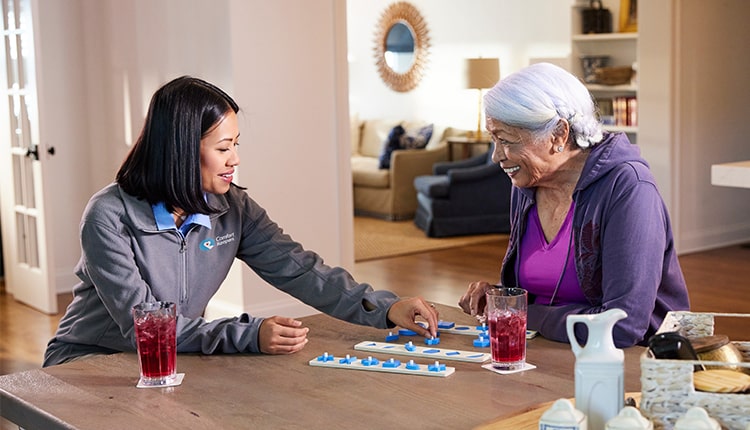Word Games for Seniors
Word games are more than just fun—they help strengthen memory, sharpen focus, and support overall brain health for seniors. Playing with caregivers or loved ones can also boost mood, reduce stress, and build meaningful social connections. This article explores the many benefits of word games, plus example games to keep minds active and engaged.

Word games are a fun way to help connect seniors and caregivers together while promoting brain health and function. Playing word games can improve memory and executive function at all ages, but it’s particularly important for seniors.
In this article, we’re going to review the benefits of word games and share some examples that are helpful at various stages of cognition. The benefits can vary person to person, and games should be adapted accordingly.
What are the mental health benefits of word games for seniors?
Think about the brain as a muscle. When you regularly exercise it, the muscle is going to tighten and improve its overall health. As we get older, the brain can begin to deteriorate with lower levels of activity and engagement.
Playing word games with caregivers can improve brain function, slow cognitive decline, and support overall well-being.
Keeps the brain strong and flexible.
Just as lifting weights builds muscle strength, word games challenge memory, problem-solving, and vocabulary, which helps the brain stay agile.
Supports memory.
The recall required in word searches, crosswords, or Scrabble acts like “reps” for short-term and long-term memory.
Improves focus and attention.
Following game rules and thinking through letter combinations strengthens concentration—similar to holding a balance pose in yoga.
What are the emotional and social benefits of word games for seniors?
Just as there are many mental health benefits of word games, there are many emotional and social benefits too.
Each game is an achievement and a task completed: a goal achieved. This contributes heavily to seniors’ ability to find purpose and keeps them mentally sharp and focused.
Improve mood.
Winning a round, learning a new word, or simply laughing together over a silly play can lift spirits and reduce stress. These activities can help to take the focus away from more pressing health concerns.
Encourages social connection.
Playing with family, friends, or peers is like joining a group exercise class. This helps seniors feel less isolated and more engaged.
Build and strengthen relationships.
It may be harder later in life for older adults to create and maintain new friendships. Word games can present an opportunity to invite an older adult into an activity one on one, or in a small group that can encourage meeting new people. Take time to point out words that might be more significant to them or pertain to their career, making the game into a storytelling and reminiscing opportunity.
Top word games for seniors
There are so many word games, here is a curated list of activities that are designed to be accessible for various levels of engagement. Feel free to adapt them as needed.
Classic board and paper word games
- Scrabble
- Boggle
- Crossword puzzles (there are free and easy to print options online)
- Upwords
- Word search books
Mobile and app word games
- Words With Friends
- Wordle
- Wordscapes
- Word Connect
- Jumbline 2
Multiplayer word games
- Taboo
- Scattergories
- Catchphrase
- Codenames
- Pictionary
Frequently asked questions
Do neurologists recommend word games for seniors?
When paired in combination with exercise, nutrition-rich diets, and other lifestyle changes, word games can have a positive impact on cognitive health. This can help with the brain slowing down as we age, giving the brain a boost (like a workout).
What are the best word games for memory?
The best ones require some form of recall and putting different thoughts together at the same time. Some good examples are: crossword puzzles, Scrabble, and word searches. They help to maintain vocabulary, and promote skills like focus and centration, and verbal memory.
Are word games enough to prevent dementia?
There is not yet a cure for dementia, however, the impact can be slowed or delayed. Word games alone won’t prevent dementia. It takes playing word games in combination with other activities and lifestyle changes. There are several modifiable risk factors for dementia, and education is one of them.
Comfort Keepers® Can Help
Our caregivers, who we call Comfort Keepers®, can help seniors prepare meals, stick to an exercise plan, and provide transportation to preventive care and other doctor’s visits. Friendly, consistent support can help seniors make healthy changes in their lives—and make it fun at the same time. Our Comfort Keepers give seniors the encouragement they need to remain healthy, happy, and engaged in activities they love every day. To find out more, contact a Comfort Keepers location near you.
Sign up to receive helpful info right to your inbox.
We understand choosing an in-home care provider can be a difficult decision, and we want to make your journey as easy as possible. We're here to support you by providing helpful senior care tips and information on in-home care and senior health and wellbeing topics.
Start a Job with a Purpose
Uplifting training and support for you every step of the way.
Apply to be a caregiver







